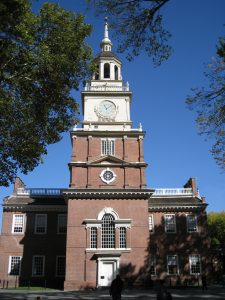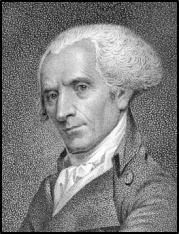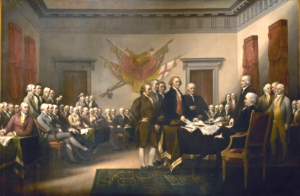1.6 – The Price of Freedom 2.0
Begin this Lesson by watching the following Chasing American Legends episode that will take you to Philadelphia and Independence Hall to bring to life the signing of the Declaration of Independence.
Although fighting had begun, it would be another 14 months before the colonists would declare their independence. They still considered themselves British citizens and sought all means possible to settle the conflict without a total break from England. For 11 years (from 1765 until 1776), the Americans worked hard to achieve reconciliation. In fact, even after armed battles had occurred not only in Massachusetts and Virginia but also in New Hampshire and New York, the Americans sent the Olive Branch Petition (1775) to the king, still seeking to peacefully settle their differences. But the king flatly rejected it without even reading it. 1
By June 1776, the Continental Congress concluded that a peaceful resolution was not possible. In early July, the delegates spent several days debating whether to become a separate nation, and then in finalizing the wording of the Declaration of Independence. On July 4, 1776, the final wording was officially approved, and a few weeks later, 56 Founding Fathers signed the document. From Great Britain’s perspective, those 56 men were all traitors, making them legally subject to the death penalty.
The Declaration reflects many of the key Christian political principles embraced by America’s Founders in its opening pronouncement:
When in the course of human events, it becomes necessary for one people to dissolve the political bands which have connected them with another, and to assume among the powers of the earth, the separate and equal station to which the laws of nature and of nature’s God entitle them, a decent respect to the opinions of mankind requires that they should declare the causes which impel them to the separation.
We hold these truths to be self-evident: That all men are created equal; that they are endowed by their Creator with certain unalienable rights; that among these are life, liberty, and the pursuit of happiness; that, to secure these rights, governments are instituted among men, deriving their just powers from the consent of the governed; that whenever any form of government becomes destructive of these ends, it is the right of the people to alter or to abolish it, and to institute new government, laying its foundation on such principles, and organizing its powers in such form, as to them shall seem most likely to effect their safety and happiness…2
As they stated in the Declaration, the Founders were literally “declaring the causes that impel them to the separation” with Great Britain when they signed the Declaration of Independence, answering the question, “why” they were creating a new nation of states. They did, however, acknowledge caution against overthrowing an existing government for “light and transient causes.” They include in the Declaration a list of twenty-seven specific “abuses, injuries and usurpations” charged against the King of England and his government. When taken together, these presented a “history of absolute Tyranny and Despotism.” These were not “light and transient causes” and therefore justified the “throwing off” of British rule and “providing new Guards for their future security.”
America’s Founders believed that rights came from God; that government must be based on the consent of the governed; and that when governments become tyrannical that they may be resisted and replaced. The document ends by clearly affirming that the patriots had “a firm reliance on the protection of Divine Providence.”3
The Declaration specifically appeals to God and then “declares” “That these United Colonies are, and of Right ought to be FREE AND INDEPENDENT STATES; that they are Absolved from all Allegiance to the British Crown,…” [capitalization in the original] This choice of words is very important. “Independent States” and “they” support the belief that they were still thirteen independent sovereign states coming together for limited purposes. The states had not yet considered, much less embraced the idea of federalism, where the states would in the future create a more centralized, yet still limited federal government.

The final paragraph of the Declaration contains a restatement of both the Mecklenburg Resolutions and Richard Henry Lee’s resolution, both discussed earlier. By pledging “our lives, our fortunes, and our sacred honor,” the members of the Congress were recognizing the high cost of failure should the War for Independence not succeed.
The Cost of Freedom, 1775-1783
The final line of the Declaration of Independence announced that the signers had personally pledged “our lives, our fortunes, and our sacred honor.” Today, most Americans do not know the price they paid or the great personal risk each faced. These men were not thinking they would someday be famous for signing the Declaration; rather, they were thinking they would be targeted and likely executed. But they did not cower in fear, nor were they ashamed of standing for their principles. In fact, it was just the opposite.
John Hancock, the President of the Continental Congress, after signing the document in large writing, purportedly declared: “John Bull [King George] can read my name without spectacles and may now double his reward of £500 [$100,000 today] for my head!”4 He added, “We must be unanimous. There must be no pulling different ways; we must all hang together.”5 Benjamin Franklin, responding with his characteristic wit, reportedly agreed, “Yes, we must indeed all hang together, or most assuredly we shall all hang separately!”6
Years later, Benjamin Rush reminisced to fellow-signer John Adams about what had occurred on the day they signed that document, and the fact that they all understood they might be hanged for what they were doing. Rush reminded Adams:

Do you recollect the pensive and awful [deep and somber] silence which pervaded the house when we were called up, one after another, to the table of the President of Congress to subscribe [sign our names to] what was believed by many at that time to be our own death warrants? The silence and the gloom of the morning was interrupted, I well recollect, only for a moment by Colonel Harrison of Virginia [a very strong and large man], who said to Mr. Gerry [a very small man] at the table: “I shall have a great advantage over you, Mr. Gerry, when we are all hung for what we are now doing. From the size and weight of my body I shall die in a few minutes, but from the lightness of your body you will dance in the air an hour or two before you are dead!” The speech procured a transient [temporary] smile, but it was soon succeeded by the solemnity [seriousness] with which the whole business was conducted.7
While Harrison’s comment momentarily lightened the somber mood of the day, they all recognized that death was a very real likelihood for each of them. America would be fighting the mighty British Empire—the greatest military power on the earth. The Founders faced the genuine possibility of losing everything they had; and in various ways, they all suffered for their decision. They clearly realized that, in the words of a noted historian, “history was strewn with the bones and blood of freedom fighters.”8
That historian calculated:
Nine signers died of wounds or hardships during the Revolutionary War. Five were captured or imprisoned, in some cases with brutal treatment. The wives, sons, and daughters of others were killed, jailed, mistreated, persecuted, or left penniless. One was driven from his wife’s deathbed and lost all his children. The houses of 12 signers were burned to the ground. Seventeen lost everything they owned. Every signer was proscribed as a traitor; everyone was hunted. Most were driven into flight; most were at one time or another barred from their families or homes. Most were offered immunity, freedom, rewards, their property, or the lives and release of loved ones to break their pledged word or to take the King’s protection. Their fortunes were forfeited, but their honor was not. No Signer defected or changed his stand throughout the darkest hours. Their honor, like the nation, remained intact.9

While retrospect clearly establishes the sacrifices of the signers, the high cost of their actions was apparent to them from the very beginning. They talked openly among themselves about the losses suffered by their fellow signers—as when Thomas Nelson of Virginia reported to Thomas Jefferson in January 1777:
Our little friend [Francis] Hopkinson has suffered greatly by these freebooters [British plunderers]. They have destroyed all his furniture, cabinet of curiosities, and his fine harpsicord, which I am told was the best that ever came to America [Hopkinson was a noted church musician]….Old [Rev. John] Witherspoon has not escaped their fury. They have burnt his library. It grieves him much that he has lost his controversial tracts [writings on theological debates]. He would lay aside the cloth [his minister’s robes] to take revenge of them. I believe he would send them to the devil if he could, I am sure I would.10
Many of these signers have been largely forgotten today, along with the high personal price each paid for the liberty we now possess and too often take for granted. As John Adams reminded the younger generation of his day, the sacrifice the Founders made should always be remembered and honored:
Posterity! You will never know how much it cost the present generation to preserve your freedom! I hope you will make a good use of it. If you do not, I shall repent in Heaven that I ever took half the pains to preserve it.11
The term “Freedom isn’t free” has often been used throughout past generations. This still rings true today in the cost of defending our nation, and it also rang true for the signers of the Declaration. Many of them did not live to enjoy the freedom they secured for us. Many lost their fortunes, their homes, their families, and even their own lives. Freedom has never been and still is not free!12
Though the words of the Declaration begin with declaring the rights of life, liberty, and the pursuit of happiness, the closing words are the ones that truly attest to the living hope of the fifty-six men who signed the Declaration. They boldly stated, “with a firm reliance on the protection of Divine Providence, we mutually pledge to each other our Lives, our Fortunes, and our sacred Honor.” This was not some light sentiment added as a postscript, but a firm declaration of the confidence in their cause and the object of their faith.
Declaring independence is one thing. Achieving it is another. Military victory was years away,13 and the peace treaty in Paris still two years beyond that.14 During those arduous years, there were many times when the outcome of the war was in serious doubt, but the leaders and the people stayed the course and finished strong to bring about victory.
- George Bancroft, History of the United States (Boston: Little, Brown, & Co., 1860), 8:130-132.
- See, “In Congress, July 4, 1776, A Declaration By the Representatives of the United States of America, in Congress Assembled,” The Constitutions of the Several Independent States of America; The Declaration of Independence; The Articles of Confederation Between the Said States (Boston: Norman and Bowen, 1785), 167-171.
- See, “In Congress, July 4, 1776, A Declaration By the Representatives of the United States of America, in Congress Assembled,” The Constitutions of the Several Independent States of America; The Declaration of Independence; The Articles of Confederation Between the Said States (Boston: Norman and Bowen, 1785), 167-171.
- This anecdote is reported by many sources, including John F. Watson, The Annals of Philadelphia and Pennsylvania in Olden Times, Being a Collection of Memoirs, Anecdotes, and Incidents of the City and Its Inhabitants, and of the Earliest Settlements of the Inland Part of Pennsylvania from the Days of the Founders (Philadelphia: Elijah Thomas, 1857), 1:399n. This account has been repeated in numerous other works over the decades.
- Benjamin Franklin, The Works of Benjamin Franklin, with Notes and A Life of the Author, ed. Jared Sparks (Boston: Tappan and Dennet, 1844), 1:408.
- Benjamin Franklin, The Works of Benjamin Franklin, with Notes and A Life of the Author, ed. Jared Sparks (Boston: Tappan and Dennet, 1844), 1:408.
- Benjamin Rush, Letters of Benjamin Rush, ed. L.H. Butterfield (Princeton: Princeton University Press, 1951), 2:1090, to John Adams on July 20, 1811.
- T.R. Fehrenbach, Greatness to Spare (Princeton, NJ: D. Van Nostrand Company, Inc., 1968), 23.
- T.R. Fehrenbach, Greatness to Spare (Princeton, NJ: D. Van Nostrand Company, Inc., 1968), 247.
- Letters of Delegates to Congress 1774-1789, ed. Paul H. Smith (Washington DC: Library of Congress, 1980), 6:24-25, letter from Thomas Nelson Jr. to Thomas Jefferson, January 2-3, 1777.
- John Adams, Letters of John Adams, Addressed to His Wife, ed. Charles Francis Adams (Boston: Charles C. Little and James Brown, 1841), 1:218, to Abigail Adams on April 26, 1777.
- For more information on the sacrifices made by the Declaration Signers, see: Benson Lossing, Biographical Sketches of the Signers of American Indpendece (New York: George F. Cooledge & Brother, 1848) (at: https://books.google.com/books?id=dtEDAAAAYAAJ&pg=PA1#v=onepage&q&f=false); Dictionary of American Biography, Allen Johnson, editor (New York: Charles Scribner’s Sons, 1928-1937), 32 vols.; John Sanderson, Biographies of the Signers of the Declaration of Indpendence (Philadelphia: R.W. Pomeroy, 1823-1827), 9 vols. (at: https://catalog.hathitrust.org/Record/000202800); Appleton’s Cyclopedia of American Biography, James Grant Wilson and John Fiske, editors (New York: D. Appleton and Company, 1888-1889), 6 vols. (at: https://catalog.hathitrust.org/Record/009905160).
- See, for example, “Timeline of Events,” National Park Service (at: https://www.nps.gov/revwar/about_the_revolution/timeline_of_events_06_10.html).
- See, for example, “Treaty of Paris,” ourd ocuments.gov (at: https://www.ourdocuments.gov/doc.php?flash=true&doc=6).
